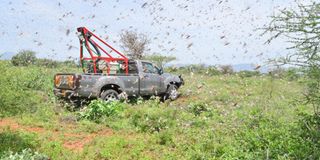Desert locust warning centre set up to avert future invasion

A vehicle used by Kajiado County to spray chemicals in areas invaded by desert locusts is pictured at Oloomanyat Village in Mashuru on February 18, 2021.
The government has stepped up efforts to avert future invasion by desert locusts by launching an early warning centre to serve local farmers.
Agriculture and Livestock Development Cabinet Secretary Mithika Linturi said the centre will help the government to detect early signs of an invasion and put in place measures to avert them.
This, he said, will ensure that farmers are protected from the migratory pest that led to loss of crops in over 24 counties in 2020.
The CS revealed that the facility has been put up with support from the Food and Agriculture Organization (Fao).
“We thank Fao for the technical and budgetary support extended to us in controlling the desert locust menace. Without the strategic support the damage could have been devastating to food systems in the region,” he said.
Mr Linturi appealed to Fao Director-General Qu Duoyng to offer technical and financial support to Kenya in hosting the International Desert Locust Conference in March.
He said the Kenyan government will pursue collaboration with Fao to enhance resilience and sustainable agrifood systems to boost food security.
The CS said climate change in Kenya is increasingly impacting the lives of citizens and the environment, leading to frequent extreme weather events like droughts which last longer than usual, irregular and unpredictable rainfall, flooding and increasing temperatures.
Mr Gachagua said President William Ruto’s administration has prioritised efforts to combat effects of climate change in arid and semi-arid counties affected by the disaster.
“We must eradicate hunger by all means necessary and that’s why we are seeking technological and innovations support from Fao for us to increase yields,” said Mr Linturi.
Dr Duoyng welcomed Kenya’s overtures for partnership in the agricultural sector. Separately, Mr Linturi yesterday held a meeting with World Food Programme (WFP) Deputy Executive Director Valerie Guarneri on Kenya’s food security status.
He was accompanied by Council of Governors Agriculture Committee Chairman and Bungoma Governor Ken Lusaka and Kenyan ambassador to Italy, Ms Jackline Yongo.
Mr Linturi told Ms Guarneri that Kenya is committed to enhancing collaboration with WFP combat natural disasters that have been experienced in Kenya, “threatening food security, resilience building and sustainable livelihoods”.
Ms Guarneri affirmed WFP’s support towards Kenya’s efforts to ensure food security.
“Water is important for livelihoods and food production. We, therefore, need to find ways of increasing water harvesting technologies, digging shallow wells and sinking boreholes to increase agricultural productivity,” Ms Guarneri said.





